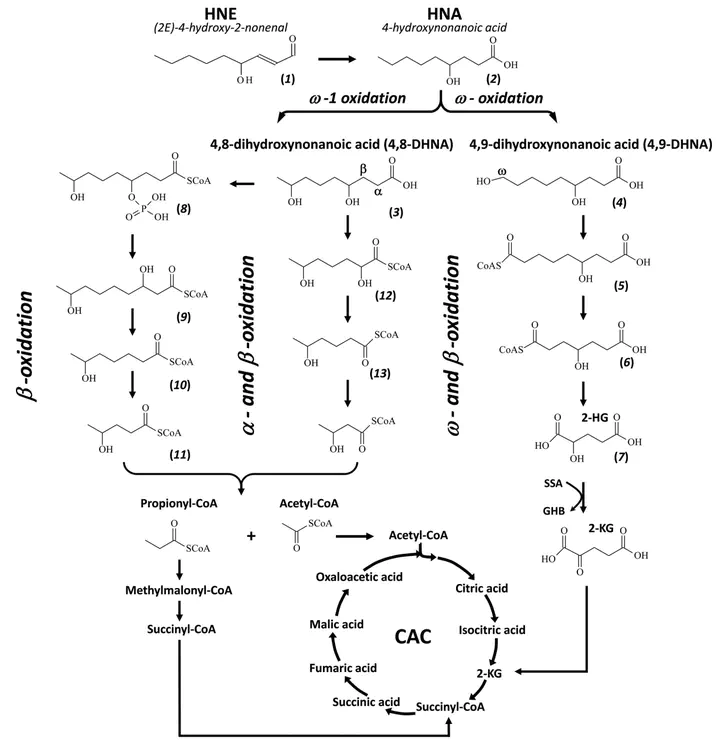Catabolism of (2E)-4-hydroxy-2-nonenal via ω-and ω-1-oxidation stimulated by ketogenic diet

Abstract
Oxidative stress triggers the peroxidation of ω-6-polyunsaturated fatty acids to reactive lipid fragments, including (2E)-4-hydroxy-2-nonenal (HNE). We previously reported two parallel catabolic pathways of HNE. In this study, we report a novel metabolite that accumulates in rat liver perfused with HNE or 4-hydroxynonanoic acid (HNA), identified as 3-(5-oxotetrahydro-2-furanyl)propanoyl-CoA. In experiments using a combination of isotopic analysis and metabolomics studies, three catabolic pathways of HNE were delineated following HNE conversion to HNA. (i) HNA is ω-hydroxylated to 4,9-dihydroxynonanoic acid, which is subsequently oxidized to 4-hydroxynonanedioic acid. This is followed by the degradation of 4-hydroxynonanedioic acid via β-oxidation originating from C-9 of HNA breaking down to 4-hydroxynonanedioyl-CoA, 4-hydroxyheptanedioyl-CoA, or its lactone, 2-hydroxyglutaryl-CoA, and 2-ketoglutaric acid entering the citric acid cycle. (ii) ω-1-hydroxylation of HNA leads to 4,8-dihydroxynonanoic acid (4,8-DHNA), which is subsequently catabolized via two parallel pathways we previously reported. In catabolic pathway A, 4,8-DHNA is catabolized to 4-phospho-8-hydroxynonanoyl-CoA, 3,8-dihydroxynonanoyl-CoA, 6-hydroxyheptanoyl-CoA, 4-hydroxypentanoyl-CoA, propionyl-CoA, and acetyl-CoA. (iii) The catabolic pathway B of 4,8-DHNA leads to 2,6-dihydroxyheptanoyl-CoA, 5-hydroxyhexanoyl-CoA, 3-hydroxybutyryl-CoA, and acetyl-CoA. Both in vivo and in vitro experiments showed that HNE can be catabolically disposed via ω- and ω-1-oxidation in rat liver and kidney, with little activity in brain and heart. Dietary experiments showed that ω- and ω-1-hydroxylation of HNA in rat liver were dramatically up-regulated by a ketogenic diet, which lowered HNE basal level. HET0016 inhibition and mRNA expression level suggested that the cytochrome P450 4A are main enzymes responsible for the NADPH-dependent ω- and ω-1-hydroxylation of HNA/HNE.